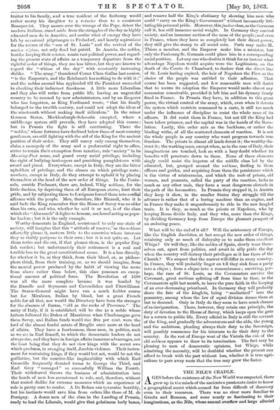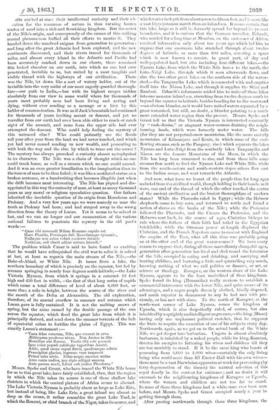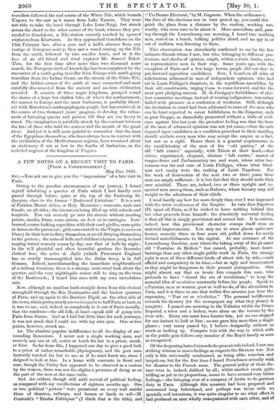THE NILE'S CRADLE.
AGES before the existence of the New World was suspected, there grew up in the minds of the ancients a passionate desire to know a geographical secret which seemed far from difficult of discovery even to their resources. There was no river more familiar to- Greeks and Romans, and none nearly so fascinating to their imaginations, as the Nile, whose annual overflow and large alluvial
Alta exclted at one.) their intellectual curiosity and their ad-
sttion for the resources of nature in thus turning barren wastes of sand into a rich and flourishing kingdom. But the secret of the Nile's origin, and consequently of the causes of this striking
annual phenomenon baffled all their efforts to master it. They handed down the unsolved enigma from generation to generation ; and long after the great Atlantic had been explored, and the new continents discovered, and their rivers traced for thousands of miles, and almost every island in the Atlantic and Pacific had been accurately marked down in our charts, there remained this locked chamber on our earth, into which no one had ever penetrated, invisible to us, but united by a most tangible and visible thread with the highways of our civilization. There was the Nile, let down like a sort of watery ladder, out of the invisible into the very midst of our most eagerly-guarded thorough- fare—our path to India,— but with its highest ranges hidden absolutely from our view in some world where for thousands of years most probably men had been living and acting and dying, without ever sending us a message or a hint by this
ladder of communication. It was as if Jack's beanstalk had continued for thousands of years inviting ascent or descent, and yet no
traveller from our earth had ever been able either to reach or catch sight of the summit, and none ft om the upper side had ever attempted the descent. Who could help feeling the mystery of this untraced clue? Who could patiently see the floods roll year after year from the land we had never reached, and which yet had never ceased sending us new wealth, and presenting us with both the way and the clue by which to trace out the secret ?
The mystery has always provoked a curiosity almost metaphysical in its character. The Nile was a chain of thought which no one could track home, as well as a stream which no one could ascend. And it was an even greater humiliation to the imagination than to the reason of man to be thus foiled ; it was like a mutilated statue, or a broken sentence, or a handwriting that becomes illegible just when the drift becomes most interesting. The Nile has piqued and dis- appointed in this way the curiosity of man, at least as many thousand years as any moral or religious speculative question. Our fathers inherited the insoluble question of its origin from Herodotus and Ptolemy. And a very few years ago we were scarcely so near the truth as Ptolemy had been ; and had strayed away in the wrong direction from the theory of Lucan. Yet it seems to be solved at last, and we can no longer end our enumeration of the various national failures to penetrate the mystery in the old poet's words :—
" Qnae tibi noscendi Nilum Romano cupido eat Haec Phariis, Persisque fuit Macedunique tyrannis , Nullaque non aetas voluit conferre futuris Notitiam, sed vincit adhuc nature latendi."
'The problem which Car is said to have found so exciting that he would have relinquished the civil war to solve it, is solved at last, at least as regards the main stream of the Nile,—the Bahr-el-Abiad, or White Nile. It issues from a lake, the northern boundary of which is precisely on the equator, but fed by streams springing in nearly four degrees south latitude,—the Lake Victoria Nyanza, from which it springs in a cataract 12 feet high and 450 feet in width, —the first of that long series of rapids which cause a total difference of level of about 6,000 feet, or more than a mile in height, between the source of the river and the mouth of the Delta at Alexandria. The old explanation, therefore, of its annual overflow in summer and autumn which Lucan gave is fully sustained. It is not the melting snows of spring, but the rains caused by the double passage of the sun across the equator, which flood the great lake from which it is principally derived, and send down the summer torrents of the belt of equatorial calms to fertilize the plains of Egypt. This was exactly Lucan's statement :—
" Vans fides veterum, Nib, quo crescat in arva
/Ethiopum prodesse nives. Non Arctos in ills Montibus cut Boreas. Testis tibi sole perusti Ipso color populi calidique vaporibus Austri. Adds, quod oume caput fluvii, quodcunque soluta Praecipitat glacies, ingresso vere tumescit Prima tabe nivis. Nilus neque suseitat undas Ante canis radios, nec ripis adligat amnem Ante parem nocti, Libra sub judice Phoebnm."
bfor uMt us to Spoke ofgreat fla and kg: Ge r ahe have fairlyLfwka reh who yh have established, abt traced ,dt hthen, le Whitedthat sea Nile region g iot home in which the Nile takes its source is one of those shallow lake districts in which the central plateau of Africa seems to abound. The Lake Victoria Nyanza is probably about as large as Lake Erie, deep as the ocean, it rather resembles the great Lake Tsad, in which the Benoue, or chief branch of the Niger, takes its source, and
which varies in depth from about seven to fifteen feet, and is more like a vast hippopotamus marsh than an inland sea. It seems certain that this lake, large as it still is, formerly spread far beyond its present boundaries, and it is curious that the German traveller, Erhardt, who resided for a long time at Mombas, on the east coast of Africa, received information only about ten years ago which led him to suppose that one enormous lake stretched through about twelve degrees of latitude, or more than 800 miles, covering a space which is now known to consist, in great part, of dry and well-populated land, but also including four different lakes,—the Nyanza Lake, from which the White Nile issues to the north, the Luta -Nzigi Lake, thrcugh which it soon afterwards flows, and also the two other great lakes on the southern side of the water- shed,— the Tanganyika Lake, which is connected with and empties itself into the Nia.ssa Lake, and through it supplies the Shird and Zambesi. Erhardt's informants misled him to unite all these lakes into one monster inland sea, stretching from twelve degrees south to beyond the equator in latitude, besides bending far to the westward —an obvious blunder, as it would have united waters separated by a great watershed, but still, no doubt, a blunder pointing to a much more extended water region than the present. Messrs. Speke and Grant tell us that the Victoria Nyanza is intersected constantly by "rush-drains," or stagnant water-courses draining the neigh- bouring lands, which were formerly under water. The hills (for they are not perpetual-snow mountains, like the more easterly mountains of Kilmanjaro and Kenia, in which some of the east- flowing streams, such as the Pangany, rise) which separate the lakes Nyanza and Luta-Nzigi from the southerly lakes Tanganyika and Niassa are the famous Mountains of the Moon, in which the Nile has long been rumoured to rise, and from these bills some streams flow north to feed the Nyanza Lake and White Nile, while from the south-eastern and south-western slopes others flow east to the Indian ocean, and west towards the Atlantic.
And now, what have we learnt of the people thus for long ages secluded from the civilized world, though holding in their hands, as it were, one end of the thread of which the other touched the centre of the ancient civilization and the busiest thoroughfare of modern states? While the Pharaohs ruled in Egypt ; while the Hebrew shepherds came to buy corn, and returned to settle and found a nation of slaves on the banks of the Nile ; while the Ptolemies followed the Pharaohs, and the Cmsaus the Ptolemies, and the Hebrews sent back, in the course of ages, Christian bishops to rule where the fathers of their faith had toiled in the Egyptian brickfields ; while the Ottoman power at length displaced the Christian, and the French Napoleon came to contest with England the empire of the East, what all this time was probably going on at the other end of the great water-course ? We have every reason to suppose that, during all these marvellously changeful ages, generation after generation has lived and died round the fountains of the Nile, occupied in eating and drinking, and marrying and bearing children, and bartering a little and quarrelling very much, knowing nothing of what we call politics or finance, or art, or science or theology. Karagwe, on the western shore of the Lake Nyanza, appears to be the least uncivilized of these kingdoms. Speke found its king (Rumanika) really anxious to establish a commercial intercourse with the lower Nile, and quite aware of its advantages, and a negro people de,cenly clothed, kindly disposed, and much superior in demeanour to any he had met with pre- viously, or has met with since. To the north of Karagwe, at the north-west corner of Lake Nyanza, comes the kingdom of Uganda, which is also despotically ruled, of course, but also inhabited by a sprightlyandintelligent negro race,—the king (Mtese) having only one unpleasant political crotchet, that he supposes the State to require the execution of one of his subjects every day. Northwards, again, as we get on to the actual bank of the White Nile, we get deeper into barbarism. Ungoro is almost absolutely barbarous, is inhabited by a naked people, while its king, Kamrasi, devotes his energies to fattening his wives and children till they are too unwieldy to stand. If it be the same king who boasts of possessing from 3,000 to 4,000 wives—certainly the only living being who could more than fill Exeter Hall with his own wives— there must be a vast Darwinian apparatus at work for preventing (by fatty degeneration of the tissues) the natural selection of this royal family in the contest for existence ; and no doubt it will succumb to the neighbouring kingdoms of Karagwe or Uganda, where the women and children are not too fat to stand. In none of these three kingdoms had a white man ever been seen before, and Messrs. Speke and Grant occupied nearly a year in getting through them. After passing northwards through these three kingdoms, the
travellers followed the real course of the White Nile, which bounds Ungoro to the east as it issues from Lake Nyanza. They were not able to take the bend through Lake Luta-Nzigi, but struck across the chord to the other corner of the bend, whence they pro- ceeded to Gondokoro, a Nile station recently reached by upward explorers from Khartoum. As they approached Gondokoro on the 15th February last, after a year and a half's absence from any vestige of European society, they saw a vessel coming up the Nile from the north, followed by two smaller boats, and in it the face of an old friend and rival explorer Mr. Samuel Baker. Thus, for the first time after more than two thousand years search, the European circle of knowledge has been completed by the encounter of a south-going traveller from Europe with north-going travellers from the Indian Ocean, on the stream of the White Nile, and the hidden corner of the earth at once connected and most carefully disconnected from the ancient and modern civilization revealed. It consists of three negro kingdoms, grouped round the shores of a large but shallow lake, of which the northernmost, the nearest to Europe and the most barbarous, is probably identi- cal with Herodotus's anthropophagous people, but has contrived, in the course of two thousand years' progress, to develop the refine- ment of fattening queens and princes till they are too heavy to stand. The imagination is painfully struck by the contrast between the fate of those who hold the sources and the mouth of the great river. And yet it is still more painful to remember that the mass of the Egyptians themselves, who have always been in contact with the civilization of the Mediterranean regions, have remained about as stationary, if not as low in the depths of barbarism, as the secluded negroes of the kingdom of Ungar°.
































 Previous page
Previous page